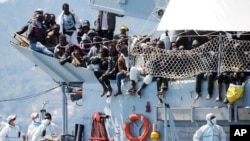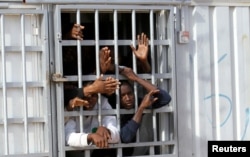People smugglers make about $35 billion a year worldwide and they are driving the tragedy of migrants who die trying to cross the Mediterranean to reach Europe, the head of the International Organization for Migration (IOM) told Reuters on Wednesday.
Increasing numbers of desperate migrants fleeing from Africa and elsewhere due to conflicts and humanitarian crises are dying as they attempt to reach Europe via Libya, coaxed to do so by smugglers as they wait in detention centers.
The death toll of people crossing the Mediterranean has reached 1,700 so far this year before the summer when many more often make the journey, compared to 3,700 for all of 2015 and 5,000 last year, said IOM head William Lacy Swing.
"Now, let's be careful because those are the people we know who died, how many other bodies are submerged in the Mediterranean or buried in the sands of the Sahara?" he said in an interview on the sidelines of a conference on migration.
"That's the tragedy and this is why we are so concerned to try to caution migrants about smugglers. The smugglers are really the big problem. It's about $35 billion a year [that people smugglers make] and we know they're making lots of money across the Mediterranean."
People smuggling now represents the third-largest business for international criminals, after gun and drug trafficking, he said.
Libya has become a major point of departure for migrants from Africa, where lawlessness is spreading six years after the fall of strongman Muammar Gaddafi and migrants say conditions at government-run migrant centers are terrible.
After visiting Libya in March, Lacy Swing said his organization is "all ready to go" and return international staff to Libya to work at migrant centers but has so far not been allowed to do so by the United Nations.
On Tuesday, the IOM and U.N. refugee agency UNCHR presented plans in Geneva on boosting operations in Libya. Lacy Swing said the IOM was ready to help the government with Libya's own internally displaced people and work in migration centers.
He said Europe's migrant crisis has been aggravated by what he called "unprecedented anti-migrant sentiment, fueled now by suspicions that some of those fleeing terrorism might be terrorists themselves."
But he urged governments to try to address the root causes of migration — conflicts, water shortages and big disparities between rich and poor countries.
"In my lifetime I have never known a situation quite like today, because you have nine armed conflicts and humanitarian emergencies from West Africa to the Himalayas," he said.
He said Europe needs to come up with a comprehensive plan on migration "but I don't see it happening any time in the near future, but we'll do everything we can to support them on it."
Lacy Swing stressed that "migration is not an issue to be solved, it's a human reality that has to be managed or governed."
"We know that historically, migration has always been overwhelmingly positive."











